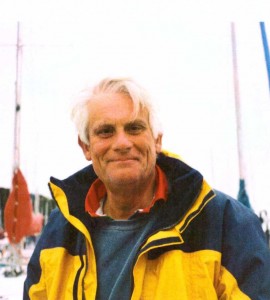John Turtle: a Life Well Lived
It is with great sadness that we have to report the passing of John Turtle, a Bushman of long standing, great popularity and considerable merit. Several Bushmen attended the memorial service. Here is Michael Kaye’s account of the service and what it revealed about John.
One of the celebrants addressing the congregation gathered in St. Paul’s, William Wilberforce’s church in Mill Hill, described John Turtle as a ‘larger than life character’. It’s a phrase we’ve often heard used. It may mean the person described was forceful, cheerful, energetic, enthusiastic, good humoured and witty. John Turtle was all those things.
Having known John (without knowing I knew him) since the late fifties and early sixties, I can attest to his possessing all of those qualities and more. I only discovered relatively recently that John, Clyde Jeavons and I breathed the same inebriated air at University College, London. We were contemporaries. John, in fact, was just over a year older than me. And two years older than Clyde. At the commemoration of John’s crowded and generous life his contributions to student dramatics were mentioned. I was unaware of this side of John’s activities at UCL. I recollect his telling me at a Savile Bushmen dinner that he had played a lot of bridge at university.
After graduation, John somehow became a factory inspector. I can picture him discussing the practicalities of manufacturing processes with managers and workers alike. John had, to coin another lapidary phrase, ‘the common touch’.
As with so many BBC people, John arrived at the Corporation (in 1968) via a devious route. But arrive he did. From what I can recollect of the BBC ‘suits’ a few years later, John, with his hairy jackets, corduroy trousers and amiable manner must have been a breath of fresh air. As someone with experience of (shudder!) industry, John was invited to work on consumer programmes such as ‘You and Yours’. Not only did he bring experience of the world outside the BBC cloisters to his work; he was also a practical producer, capable of turning his hand to sound technology and even vision. By 1975 John was Editor, Consumer Programmes.
In 1979 our paths crossed again. Unbeknown to me, John and I were both boarded for the job of Head of Radio Training. The fact that John was appointed indicates that Douglas Muggeridge was intelligent enough to choose the better candidate. John and Bennett Maxwell devised courses that were based on sound BBC principles (pardon the pun) and memorable teaching. Many of the senior broadcasters in today’s BBC owe their careers to courses in the Langham organised by JT and BM.
Michael Worms’ tribute to John reminded us of Mr. Turtle’s fierce defence of all things Mill Hill. Clearly John, in his work with the Mill Hill Preservation Society, was a doughty fighter. He wished to conserve all that was best in this green and pleasant corner of Britain. John’s role in the Society grew until he was chairing meetings with local councillors. He was described by Michael as having ‘confidence and authority’. He was also an astute cross-examiner. When Charrington’s wished to introduce a new pub to the area, John’s questions, displaying a deep understanding of planning laws, put the senior barrister for Charrington’s to ignominious flight.
The last bearer of tribute was The Reverend Neil Robbie, John’s son-in-law. He went back even further in John’s life, informing us that John had been born in King’s Lynn. John attended King Edward VII School in that town. John always quoted the old Norfolk adage, ‘Do Different’. The speaker developed this theme. John’s ‘difference’ was a stout defence of the ancient ways, not just of Britain, but of England; and not just of England, but of Norfolk.
We learned so much about John. His love of music, for example. He was an enthusiastic performer on the banjo, the harmonica and the flute. His love of things British extended to the exclusive use of Pears soap; the consumption of Ambrosia rice pudding; and the flourishing of a vast polka-dotted handkerchief. John loved traditional jazz (he was a child of the Fifties, after all) and military bands. He adored cats and P.G.Wodehouse. But above all he loved sailing. In all, John owned three vessels. He was a ‘qualified’ mariner. Neil vouched for never feeling in a moment’s danger when crewing for John. For gregarious John the ‘best times’ were when he and his wife, Jenny, were sailing alone together.
John’s beloved family was in strong evidence on this day of collective celebration of a life well lived. His grandchildren were in the church. Josie, his younger daughter read Masefield’s Sea Fever, cousin Caroline read Psalm 23, friend Charly read the Tennyson poem Crossing the Bar, son-in-law Martin read a passage from Mark, and Amanda, his elder daughter, read the prayer Voyage. There were jokes about their father, showing that his sense of humour lives on in them and allows them to make a gentle joke or two at John’s expense.
John was a writer of comic doggerel verse. Jenny has gathered this verse together into a book and had copies printed so that his family and friends can remember his humour and what it means to be ‘larger than life’.


No Response to “John Turtle: a Life Well Lived”